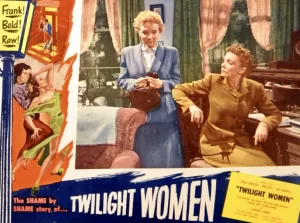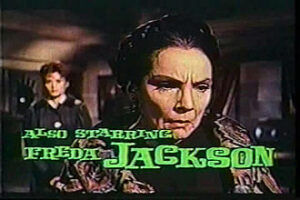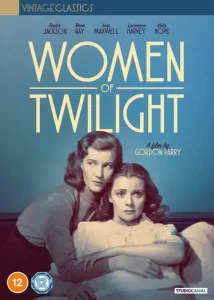Women of Twilight [Twilight Women] ** (1952, Freda Jackson, Rene Ray, Lois Maxwell, Laurence Harvey, Joan Dowling, Dora Bryan, Vida Hope) – Classic Movie Review 12,920
The once controversial 1952 drama film Women of Twilight deals with ‘the social problem of the unmarried mother’ and is the first British-made film to be given an X certificate.
‘Today’s One-Mistake Girls!’
Director Gordon Parry’s once controversial, now unremarkable 1952 British black and white drama film Women of Twilight [Twilight Women] stars Freda Jackson, Rene Ray, Lois Maxwell, Laurence Harvey, Joan Dowling, Dora Bryan, and Vida Hope. If it is remarkable in any way, it is only that it was the first British film to receive the then just introduced X certificate as suitable only for adults, apparently, as it deals with ‘the social problem of the unmarried mother’.
It tried to shake things up, challenge the status quo a bit, and be about something contemporary. It sheds light on a lot of attitudes, prejudices and ambitions of the day at a time of great change in the UK. So it is of more interest historically than as a film.
Unfortunately, Women of Twilight is an unattractive, wildly dated and faded Fifties British melodrama about baby farmer Mrs Helen ‘Nelly’ Allistair (Freda Jackson), a sadistic, unscrupulous woman who makes money by taking advantage of unmarried mothers, providing room and board for vulnerable unsuspecting innocents while selling children for adoption.
Rene Ray, the star of the London stage production, plays the central role of unmarried nightclub singer Vivianne Bruce, who finds a room in Nelly’s boarding house after her lover Jerry Nolan is arrested for murder. Vivanne hates sharing a room with Christine ‘Chris ‘ Ralston (Lois Maxwell) and her child, but they become friends after Chris helps Vivanne in an argument with another boarder.
Women of Twilight is a rather boring drama, with fairly slovenly writing and slack direction, and also with unimpressive performances. But then the more than reasonable actors in really quite a nice cast are struggling against Anatole de Grunwald’s weak script derived from a very popular controversial 1951 play by Sylvia Rayman. They made efforts not to sensationalise the then controversial subject but the film found itself accused of that anyway (the play too, of course).
It is not an ideal role for Lois Maxwell, nor for Laurence Harvey, both uncomfortable. But, to be fair, Rene Ray gives a sympathetic performance as damsel in distress Vivanne Bruce, and Freda Jackson gives an entertaining workout of her regular ruthless woman act.
As usual, many changes were made to the play, including the introduction of Vivianne’s condemned lover Jerry Nolan, giving work to contract player Laurence Harvey, giving uncredited roles to a clutch of actors including Arthur Mullard as Prison Warder, and changing Laura into the German continental boarder Lilli (Ingeborg Wells).
The British Board of Film Censors censored the dialogue. To gain an X certificate, “you rotten little bastards” had to be changed to “you rotten little brats”, “you sanctimonious little bitch” to “you sanctimonious little fool” and “I was raped” to “I was taken advantage of.”
It was shot at the Gate Studios, Borehamwood.
Rene Ray, Vida Hope and Betty Henderson return from the original West End production.
Press shown on 4 November 1952, the film opened at the Plaza, Piccadilly Circus, in London on 15 January 1953, and went on UK general release on 23 February 1953.
Controversy brings its rewards. It was a very nice hit for production company Romulus Films and distributors British Lion Films. On a budget of £49,216, it earned £154,620 at the box office.
The cast are Freda Jackson as Mrs Helen ‘Nelly’ Allistair, Rene Ray as Vivianne Bruce, Lois Maxwell as Christine Ralston, Laurence Harvey as Jerry Nolan, Vida Hope as Jess Smithson, Joan Dowling as Rosie Gordon, Dora Bryan as Olga Lambert, Dorothy Gordon as Sally, Ingeborg Wells as Lilli, Mary Germaine as Veronica, Clare James as Molly, Betty Henderson as nurse, Arthur Mullard as Prison Warder, Dandy Nichols as Third Landlady, Bruce Beeby as Detective, Arnold Bell as Barrister, Marguerite Brennan as Miriam, Daniel Brown as Courtroom Spectator, Harry Brunning, Cyril Conway, Michael Cockran, Gordon Craig, Robin Dowell, Richard Duke as’23 Club’ Patron, Liam Gaffney as Manager of ‘The 23 Club’, Geoffrey Goodheart, Edna Morris as Second Landlady, Katharine Page as First Landlady, Roy Russell as Doctor, Cyril Smith as Flinton, Emile Stemmler as Club Waiter, and Ben Williams as Detective.
The play was first staged at the Regent Theatre, Hayes on 30 July 1951. A different production was staged at the Embassy Theatre in Swiss Cottage, London, from 15 October 1951. It transferred to the Vaudeville Theatre in the West End from 7 November 1951 to 19 April 1952. The show went on tour, the film version was made, and the play was revived at the Victoria Palace, London, on 18 June 1952, playing twice-nightly, with, Freda Jackson, star of the yet to be released film was added to the cast.
The UK tour continued and was also popular at regional repertory theatres, where Freda Jackson spent much of 1954 starring in the play.
They took the play to New York, where it opened at the Plymouth Theatre on 3 March 1952 but it closed on 8 March after only eight performances. It was the only Broadway appearances for Betty Ann Davies, Miriam Karlin, Gwen Watford and June Whitfield.

Irene Lilian Brodrick, Countess of Midleton (née Creese, known as Rene Ray, 22 September 1911 – 28 August 1993).
Rene Ray starred in the London stage production, playing the central role nearly 450 times In 1951–52 before reprising her performance in the film version. Born Irene Lilian Creese, and becoming by marriage Irene Lilian Brodrick, Countess of Midleton, she signed her name Rène not René.
She starred in The Passing of the Third Floor Back (1935), His Lordship (1936), The Green Cockatoo (1937), The Return of the Frog (1938) and They Made Me a Fugitive (1947).
© Derek Winnert 2024 – Classic Movie Review 12,920
Check out more reviews on http://derekwinnert.com




